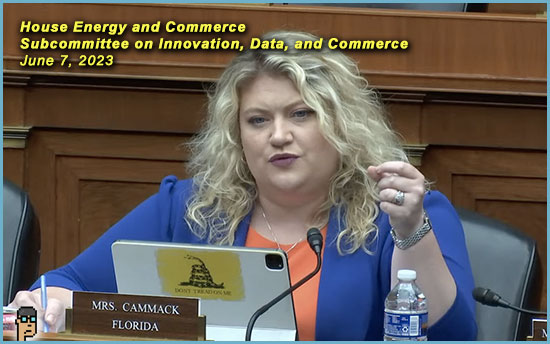As she began her 5-minute allotment of the Q&A, Rep. Kat Cammack (R, FL) let loose with a “quote of the day” as she identified herself “the token millennial” at the blockchain hearing run by House Energy and Commerce’s Subcommittee on Innovation, Data, and Commerce titled, “Building Blockchains: Exploring Web3 and Other Applications for Distributed Ledger Technologies.
Tokenized, indeed.
In spite of being the last Member to question the hearing’s witnesses, Cammack seemed to relish the chance to explore several areas in which she believed distributed ledger technology and digital assets could have compelling purposes. See the video of Rep. Cammack’s Q&A.
(lightly edited for clarity)
REP. KAT CAMMACK: How do you envision blockchain changing the future of gaming and even going so far as, say, the metaverse?
RYAN WYATT, POLYGON LABS: I appreciate the question and am empathetic to it, especially having kids and my wife not being particularly keen with video games. But, I think one thing that a lot of folks don’t realize is the way that we think about video games – Mario, Tetris – it is evolved. They are digital worlds. People are learning. They’re interacting. They’re socializing. They’re wanting to spend their time inside of these environments, whatever it is that they’re doing, right? And there’s obviously a variety of things.
So, with this, is people want to spend money where they’re spending time – that’s a very natural behavior for anyone to do. Whether you’re a kid or an adult that are interacting in these digital worlds, that’s important. So therefore, you see a lot of digital goods being purchased inside of these games. Whether it’s a cosmetic item for you to have some representation in-game or whatever the case may be. As you pointed out, it’s generating hundreds of billions of dollars. YouTube’s one of the largest verticals in the (gaming) business.
I think what this allows people to do is – instead of just licensing this from the publisher – they can now own it. If you spend money on something you deserve to own it. You don’t just license the sweatshirt from Nike. You buy it, it’s yours. You can give it to me. You can trade it to me. You can sell it to me and I think that’s really important. And so these digital goods deserve more rights. People are spending a lot of money on it. They deserve more autonomy on how these things can be used. There is no better way to solve for that then putting these on open blockchain protocols.
REP. KAT CAMMACK: Mr. Sudler, I want to shift gears a little bit. We’ve talked a little bit here today about the uses that can be applicable to federal government and I want to just expand that a little bit. How do you foresee – and I’m running out of time – but blockchain technology, how could that be used for, say, foreign aid? Particularly in countries where we don’t have the most sophisticated financial systems, we don’t have necessarily the means. How can we utilize the technology today to utilize foreign aid more effectively utilizing blockchain?
PROFESSOR HAASHI SUDLER: I think there’s a couple of ways in which you could do that. Some of my students have explored that very same topic. If foreign aid is being sent to a country, how do we make sure it’s getting into the right hands, it’s not getting to adversaries or people who are wasting that money? So, the blockchain can keep track to some degree of where that individual is on the receiving side and whether they’re receiving that payment or not. There’s some complexities in terms of the receiving “end” and what actually do they do with it, and obviously that gets into tracking, and who’s actually spending that money at the end of the day.
The other way is helping communities trade their own community coin. So, if you go into that country and say, “We’re going to help set up some infrastructure, where maybe there’s a community coin, it allows for self organization, allows for some particular region to have an internal economic system based on a coin that is well structured, has some rules in terms of how it’s used. That could be a way of aiding some sort of group outside of this country without necessarily just sending money but actually helping build an economy up.
REP. CAMMACK: And to take that one step further, how do you foresee us using blockchain to prevent waste, fraud and abuse and cut down costs with federal programs, things like SNAP, EBT etc.?
PROFESSOR SUDLER: Yeah, if you have something like SNAP on a blockchain, now you’re starting to track whether an individual is using those particular services appropriately. And this does get into identity itself and tracking the individual who’s using those particular programs and some of their activities on the blockchain.
That does get into a new area of technology of identifying a person on the blockchain itself – so, some unique identifier that will track their identity on the blockchain and then how they’re using some of the federal programs that they are allowed to use. So we are looking very closely at identity, obviously, it gets into a lot of privacy, and how do we do that correctly? But there certainly is that type of use case that has some potential.
REP. CAMMACK: Certainly. I have concerns about the privacy issues surrounding blockchain and how technology is going to evolve around the sense that we need our constitutional rights to be protected. We have a right to privacy. And so, kind of threading that needle is something that I’m very interested in.

